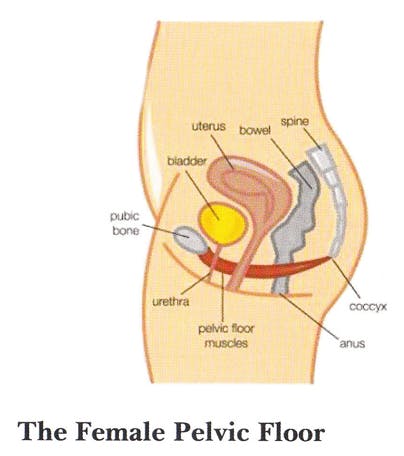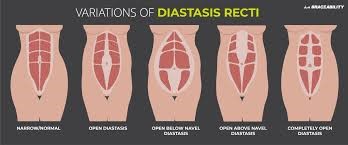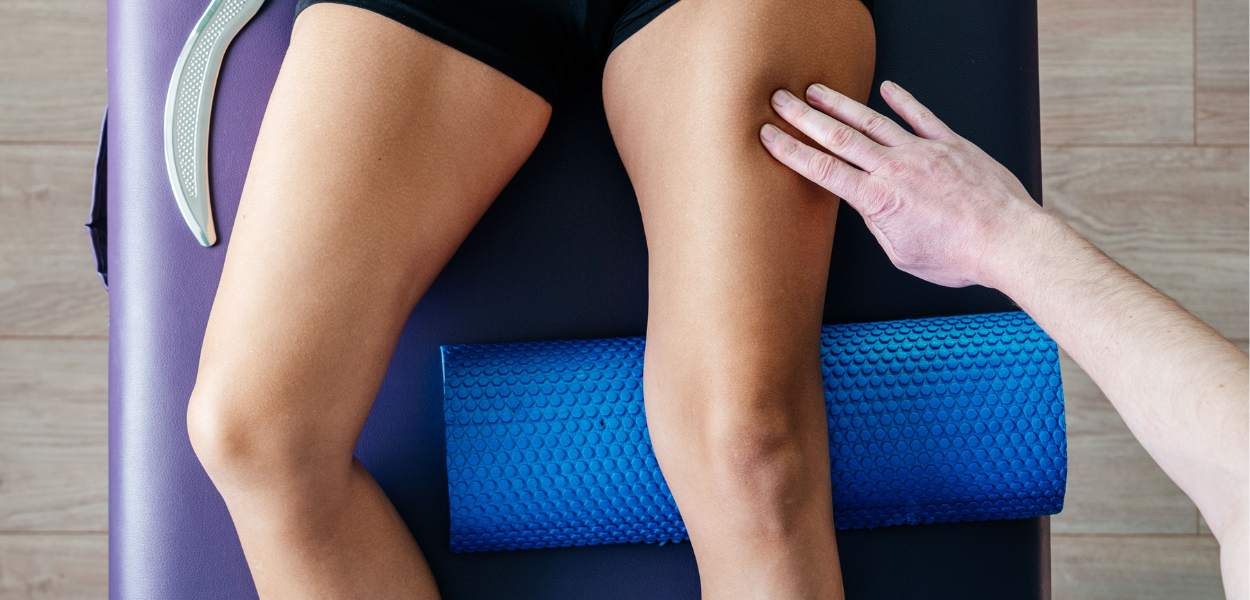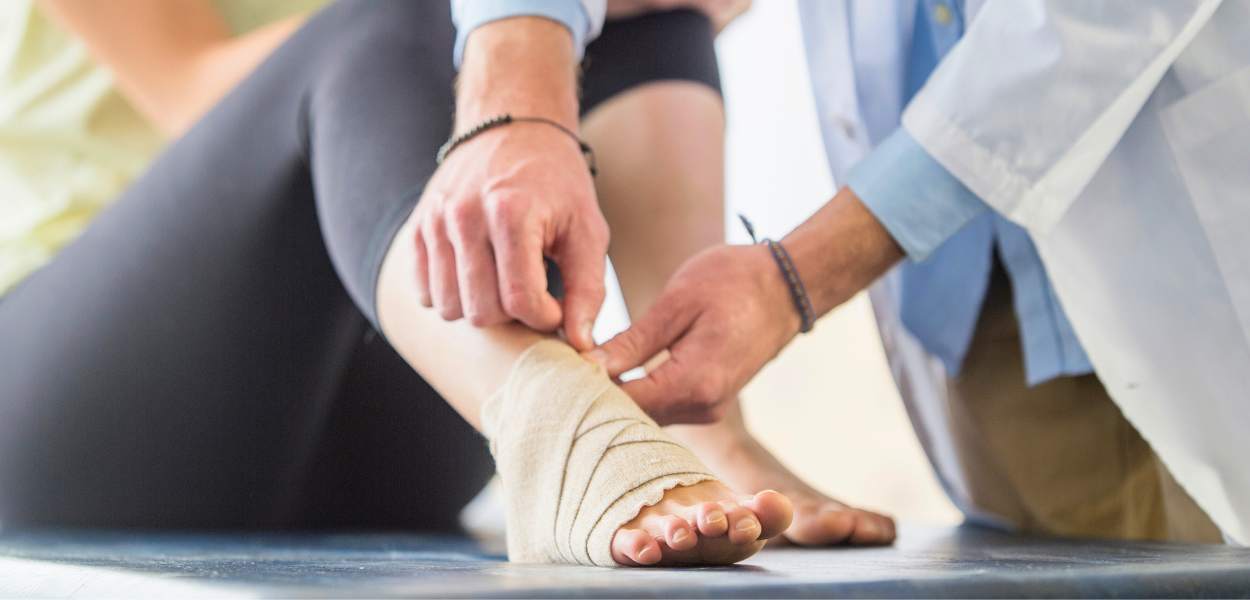All About Runner’s Incontinence

Do you leak every time you run?
Do you leak every time you jump?
Do you leak every time you go down slope?
You could be suffering from Runner’s incontinence.
Why leaking when running?
Every time you run, the intra-abdominal pressure pushes down against the pelvic floor.
The pelvic floor muscles are the layer of muscles that support the pelvic organs: bladder, bowel and uterus in women. It spans the bottom of the pelvis but because it is a thin muscle, it tires easily and can no longer hold urine in.

Causes of weak pelvic floor:
- Pregnancy
- Supporting the weight of the uterus during pregnancy
- Abdominal separation (diastasis rectus) during pregnancy
- Vaginal childbirth
- Obesity
- Chronic constipation
- Constant coughing
- Surgery that require cutting the pelvic floor muscles
- Lower levels of estrogen after menopause
Symptoms of weak pelvic floor:
- Leaking small amounts of urine when coughing, sneezing, laughing, running or jumping
- Failing to reach the toilet in time
- Passing gas from either the anus or vagina when bending over or lifting
- Reduced sensation in the vagina
- Tampons that dislodge or fall out
- A distinct bulge at the vaginal opening
- A sensation of heaviness in the vagina
Weak Pelvic floor due to pregnancy
If you have had given birth vaginally, the pelvic floor muscles might have been overstretched, causing them to be weak and thus leakage happens.
Our experienced Women’s Health Physiotherapist can test the strength of the pelvic floor manually to see if there’s any asymmetry in sensation and strength in both sides of the pelvic floor. She will differentiate between deep pelvic floor muscles and superficial pelvic floor muscles strength. She will also test the strength mechanically with a Biofeedback machine, so that an accurate measurement can be recorded before and after treatment.
Treatment would include electric stimulation, Kegel exercises, Reformer Pilates exercises, and mat Pilates as home exercise.

What about Abdominal Separation?
Another cause of incontinence is abdominal separation (diastasis rectus). During pregnancy, your abdomen splits open for the growing belly. After giving birth, unfortunately the abdomen does not repair itself.
Our Women’s Health Physiotherapist can assess the severity of the abdominal separation and prescribe tailor made Reformer Pilates exercises to mend back the abdominal separation.
Even after you have given birth 10 or 20 years ago, the abdominal separation can still be mended.
Once the abdominal separation is mended, there would be less intra-abdominal pressure pushing down on the pelvic floor, and with strong pelvic floor muscles, there would NO LONGER be any leaking.
Solution for Runner’s incontinence
Second, mend the abdominal separation.
If you only treat the weak pelvic floor but not the abdominal separation, then you will only have temporary relief because you have not treated the root cause of the problem.
This is the reason why the combination of pelvic floor muscles strengthening, and abdominal separation mending is the best solution for Runner’s incontinence or any other type of incontinence.
5 tips for Runner’s incontinence
- Avoid drinking too much fluid before running
- Avoid drinking coffee and caffeinated tea before running. You can drink it after running
- Empty your bladder before running
- Wear proper running shoes with good shock absorption in order to minimize the shock to your knee joints and minimize the pressure on the pelvic floor
- Run on running track or treadmill instead of pavement

Q&A
Q: I have 2 kids, 12 years old and 10 years old. They were both naturally delivered. In the past year, I have been training for running competitions, and I have noticed that I leak in the first 15 minutes of running. I have been doing Kegel’s exercise for 3 months now, but why is it that it is not helping?
A: First of all, are you doing the Kegel’s exercise properly? You need to consult a physiotherapist who specialize in women’s health to assess your performance.
Second, you might have abdominal separation from the previous pregnancies. The core muscles include the transverse abdominal and multifidus. It holds your trunk like a corset, lessening the intra-abdominal pressure, thus putting less pressure on the bladder and pelvic floor.
If you have abdominal separation, all the pressure goes down onto the pelvic floor and so you leak when you run.
It would be best to see a women’s health physiotherapist and mend the abdominal separation and assess your pelvic floor strength.
It is very important to mend the abdominal separation because if you only strengthen the pelvic floor, the leaking would subside but will always reoccur since you have not treated the root cause of the problem.
Q: I just had a baby 6 months ago. I noticed some incontinence when I lift, cough and run. I am planning to have a second child. Should I wait until I am done giving birth to my second child and then address the incontinence, or should I see a women’s health physio now?
A: Yes, incontinence can be fixed no matter what age you are. Since you never had kids, it is unlikely that you have abdominal separation. But, because you have put on 20 pounds around your waist, that extra weight is pushing down on your pelvic floor and it might have also overstretched your core muscles. When your core muscles are weak, it cannot reduce the intra-abdominal pressure, thus the pelvic floor cannot hold the urine whenever you go down slope.
The pelvic floor muscle is like any other muscle in your body. It can regain its strength if you perform the appropriate strengthening exercise. If you want to strengthen your biceps, you do biceps curl. If you want to strengthen your pelvic floor, you do Kegel exercise.
Just make sure you are doing it correctly.
Q: I am 60 years old, never had any kids but I am a bit overweight. In the past 5 years, I have put on 20 pounds around my waist. I am trying to lose weight by going hiking but every time I go down slope, I leak. I want to continue hiking but the incontinence is making me very embarrassed! Can you fix the incontinence even though I am 60 years old?

A: Yes, incontinence can be fixed no matter what age you are. Since you never had kids, it is unlikely that you have abdominal separation. But, because you have put on 20 pounds around your waist, that extra weight is pushing down on your pelvic floor and it might have also overstretched your core muscles. When your core muscles are weak, it cannot reduce the intra-abdominal pressure, thus the pelvic floor cannot hold the urine whenever you go down slope.
The pelvic floor muscle is like any other muscle in your body. It can regain its strength if you perform the appropriate strengthening exercise. If you want to strengthen your biceps, you do biceps curl. If you want to strengthen your pelvic floor, you do Kegel exercise.
Just make sure you are doing it correctly.
Q: I am 5 months pregnant and my belly is bigger than normal pregnant women. I noticed that my big belly is pushing down on my bladder, so I leak before I reach the toilet in time. I used to run 3 times a week. Now, because of my incontinence, I cannot walk, nor run without leaking. Since I am pregnant, can the physio still work on the pelvic floor?

A: Yes, the physiotherapist can help even if you are pregnant.
Normally, the women’s health physio would check the pelvic floor externally and internally. But because you are pregnant, it is most likely that the physio will only check externally and make sure that you know how to engage the pelvic floor.
However, it seems like the big belly might be the cause of your incontinence.
You might have abdominal separation causing extra pressure onto the bladder.
There is different severity of abdominal separation, the more severe it is, the harder you have to work in order to mend it back.
Right now, is the best time to start mending back your abdominal separation!
Specific Reformer Pilates and home exercise would be prescribed according to your abdominal separation.
When your core muscles become stronger, there would be less pressure on the bladder and consequently less leaking.
Book a session with our friendly physiotherapists for an in-depth assessment.




